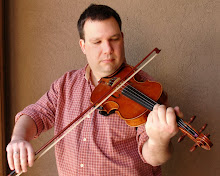This violin had extensive woodworm damage to the spruce top that had been previously repaired using wood putty. The bass bar was too large and poorly shaped. There was a crack on the treble side of the back near the soundpost.
The following repairs were made to this violin:
- Repair crack on back.
- Removal of loose wood putty used to fill woodworm holes in the belly.
- Fill cavities in the belly with Abatron Liquid Wood, a highly technical epoxy mainly used in historic architectural applications. This is far less invasive than the traditional removal of wood to place large chest patches. The epoxy has the same flexure as the original wood and pigments can be added to match the wood color. This is not a product found at the corner DYI store! This procedure is outlined in "Less-invasive Repair of Worm Tracks" by Andrew Ryan in the newly published 3 volume conservation manual by IPCA-Canada, "The Conservation, Restoration, and Repair of Stringed Instruments and Their Bows."
- Re-graduate the bass bar to achieve standard measurements and tuning nodes for the belly plate.
- Restore the edges of the belly.
- Restore missing one corner and purfling in several places.
- Patch the belly with new wood at the blocks to restore a stable gluing surface.
- Glue and cleat 5 cracks in the belly.
- Add maple sound post veneer (not a patch) on the belly.
- Touch up the varnish once repairs are completed. Match any new wood to the existing varnish.
- Bush the A-string peg.
- Complete set-up including planing fingerboard, new soundpost and new bridge.
When I delivered it to the owner, he told me it sounds better than ever and he will play it in his next concert with the Alabama Symphony Orchestra, performing Beethoven's 9th Symphony.
 |
| Belly before restoration |
 |
| Belly interior before restoration |
- Repair crack on back.
- Removal of loose wood putty used to fill woodworm holes in the belly.
- Fill cavities in the belly with Abatron Liquid Wood, a highly technical epoxy mainly used in historic architectural applications. This is far less invasive than the traditional removal of wood to place large chest patches. The epoxy has the same flexure as the original wood and pigments can be added to match the wood color. This is not a product found at the corner DYI store! This procedure is outlined in "Less-invasive Repair of Worm Tracks" by Andrew Ryan in the newly published 3 volume conservation manual by IPCA-Canada, "The Conservation, Restoration, and Repair of Stringed Instruments and Their Bows."
- Re-graduate the bass bar to achieve standard measurements and tuning nodes for the belly plate.
- Restore the edges of the belly.
- Restore missing one corner and purfling in several places.
- Patch the belly with new wood at the blocks to restore a stable gluing surface.
- Glue and cleat 5 cracks in the belly.
- Add maple sound post veneer (not a patch) on the belly.
- Touch up the varnish once repairs are completed. Match any new wood to the existing varnish.
- Bush the A-string peg.
- Complete set-up including planing fingerboard, new soundpost and new bridge.
 |
| Belly in aluminum frame with woodworm cavities |
 |
| Epoxy filler added to wood |
 |
| Back after Restoration |
 |
| Front after Restoration |
When I delivered it to the owner, he told me it sounds better than ever and he will play it in his next concert with the Alabama Symphony Orchestra, performing Beethoven's 9th Symphony.




